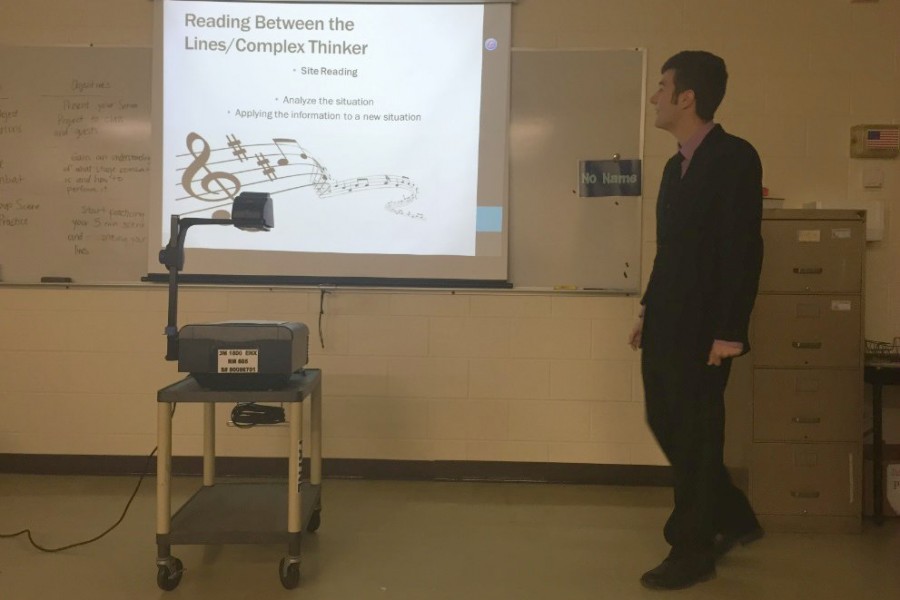Seniors scramble to finish strong in senior English
IMAGE / Amellia Vasquez-Collins
Senior Noah Pfeifer demonstrates how to sight read sheet music as his complex thinking skill for his senior project.
The last marking period of high school can be a busy time for seniors as they make plans for when high school is over. During this time, seniors may be working up to 24 hours a week, preparing for their senior exit projects, and taking exams.
A senior exit project is a presentation done by seniors that display their character and post-high school plans.
Among other things, such as prom, exams, planning for college, sports, and working, the senior project is often put off until the last moment.
The project is started in the first semester, with the application essay and research paper. During the second semester, seniors write several more essays to incorporate into their project.
Students begin presenting the projects in late April and continue until exams.
The senior project is heavily weighted in the second semester, and for some students it is what stands between themselves and their diploma.
Senior Jordan Harper said that he currently has a 35 percent in senior English because he got behind on the essays that are used in the senior project.
Students must pass either both semesters, or one semester and their exam in order to receive credit for senior English. This is where the senior project can become crucial to graduating.
Students who have already failed last semester, and are close to failing this one, must do well on their senior project in order to pass the class.
“I have to get at least a C on the senior project,” Harper said.
Students that do not pass second semester of senior English have to attend summer school to receive the half credit in order to graduate.
Another barrier some seniors create for themselves is when they miss too much class time.
Currently, many seniors are in that position, according to Assistant Principal Matt Moore.
“Seventy-five seniors are over nine absences,” Moore said.
Therefore, these seniors have to take their exams and pass them with a 78 percent or higher, regardless of their marking period grades, in order to receive credit.
Luckily, the senior projects rubric offers extra credit in every area of grading and the extra credit is not difficult to attain.
For example, students must arrange a portfolio of the essays they have written for the project. They could receive extra credit in the area of the portfolio if all necessary items are present, in order, in a portfolio or folder and turned in before the presentation.
Even in the area of attire, students can receive extra credit.
Once the projects are started, there are usually two presentations in each senior English class for the rest of the school year. This means that there are no assignments after the end of April that students can use to raise their grades, excluding the senior project.
Though the end of the year is an eventful time for seniors, it may not be the most productive, and it tends to stress out many seniors. For many students, their performance in senior English is the source of their stress.
Senior Noah Pfeifer is one of the students who has worked hard and was ready to present his presentation.
“I’m confident in myself because I’ve taken the time to practice,” Pfeifer said. “Quite a few people are (depending on the senior project to raise their English grade) because senioritis hits them hard.”

Class: Senior
Hobbies: Kayaking, Walking, Biking, Being outdoors and with friends.
Athletics: Cross country
Future Plans: U-M Flint, Western Michigan...










